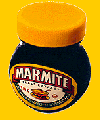DBE IN LOUISIANA
A British and Commonwealth Women's Organization

Marmite - You Either Love it or You Hate it


As Brits, we all know about Marmite. And we are either addicts . . . or not!
SO WHAT IS MARMITE?
The main ingredients are a natural byproduct of brewer's yeast, vegetable and spice extracts and vitamins and minerals.
HISTORY OF MARMITE
The original concept that yeast could be made into a food product which resembled meat extract was discovered by a German chemist Liebig in 1680. In 1902 the Marmite Food Company was formed to create this product for popular consumption. They rented a disused malthouse in Burton-on-Trent for the modest sum pf 100 pounds a year, and set to work. Their first problem was to sell the distinctive taste to the British public.
The discovery of vitamins in 1912 helped the popularity of Marmite, which was found to provide a good source of many B vitamins. Marmite was served to the soldiers on military duty, particularly to combat outbreaks of beri-beri and other diseases. During the Second World War it was used as a dietary supplement in prisoner-of-war camps.
Marmite had arrived! It could almost be described as a cult. Advertising focused on the benefits for children, and in the 1980s, the "MY MATE MARMITE" campaign was launched. More recently, Paddington Bear has been the Marmite advertising symbol.
WHAT DO WE DO WITH MARMITE?
Spreading it on toast or in a sandwich is most common. It should be spread very t-h-i-n-l-y (not like jam) because of its strong flavor. It can be tasty on hot buttered crumpets or crackers. A teaspoon of marmite can be added to soups, casseroles and almost anything savory to add flavor. Some nursing mothers dab a little on their nipples before feeding their infants!
NOT ALL MARMITE IS THE SAME!
Surprisingly, not all Marmite is equal. The bone fide stuff and most highly sought after is the Burton-on-Trent original, although any made in the UK is acceptable. And the next choice is Aussie Marmite.
A MARMITE MOTION IN THE HOUSE OF COMMONS
A Commons motion marked the 100th anniversary of Marmite.
"We take intense satisfaction from the essential Britishness of the product and its lack of appeal for the majority of the world's population."
It is an oft-quoted fact that the world is divided into those who like Marmite and those who are imbeciles. As someone who was not brought up on Marmite (that's right - blame my parents!) I have no comment.
I received an email from Maggie Hall, who was excited about her book "The Mish-Mash Dictionary of Marmite" She tells me that DBE gets a mention - the page on marmite on this site is mentioned. I think that's a first for this site- to be mentioned in a book.